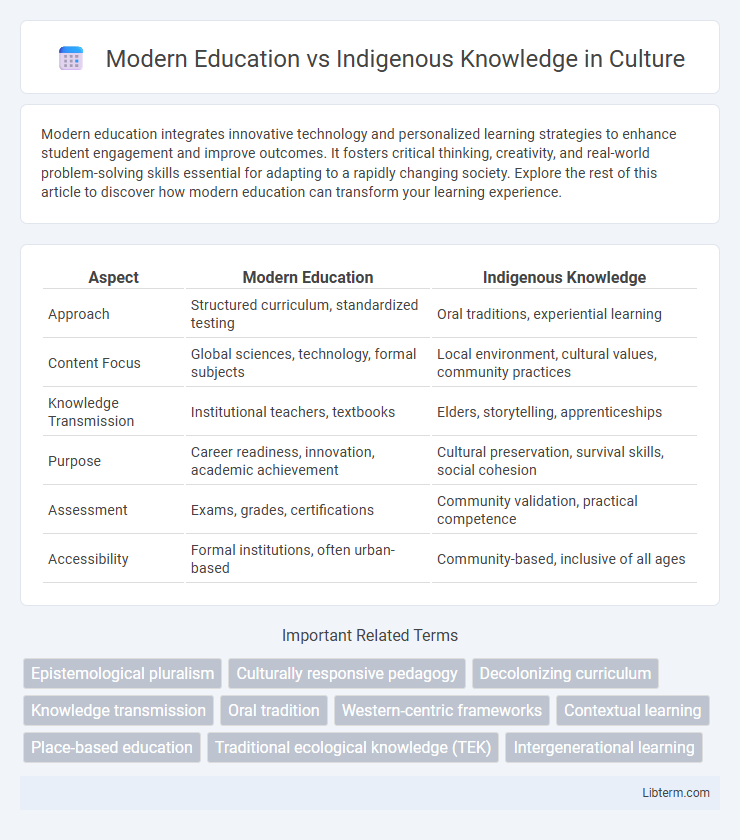Modern education integrates innovative technology and personalized learning strategies to enhance student engagement and improve outcomes. It fosters critical thinking, creativity, and real-world problem-solving skills essential for adapting to a rapidly changing society. Explore the rest of this article to discover how modern education can transform your learning experience.
Table of Comparison
| Aspect | Modern Education | Indigenous Knowledge |
|---|---|---|
| Approach | Structured curriculum, standardized testing | Oral traditions, experiential learning |
| Content Focus | Global sciences, technology, formal subjects | Local environment, cultural values, community practices |
| Knowledge Transmission | Institutional teachers, textbooks | Elders, storytelling, apprenticeships |
| Purpose | Career readiness, innovation, academic achievement | Cultural preservation, survival skills, social cohesion |
| Assessment | Exams, grades, certifications | Community validation, practical competence |
| Accessibility | Formal institutions, often urban-based | Community-based, inclusive of all ages |
Introduction to Modern Education and Indigenous Knowledge
Modern education emphasizes standardized curricula, formal classroom settings, and the integration of technology to enhance learning outcomes across diverse disciplines. Indigenous knowledge is rooted in ancestral traditions, oral histories, and experiential learning, deeply connected to local ecosystems and cultural practices. Understanding both systems reveals complementary strengths that can foster holistic education and sustainable development.
Historical Contexts and Development
Modern education systems developed primarily during the Industrial Revolution, emphasizing standardized curricula, formal institutions, and scientific methods to meet the demands of industrialized societies. Indigenous knowledge, rooted in oral traditions and community practices, evolved over centuries, preserving ecological wisdom, cultural identity, and sustainable resource management. The historical context reveals a contrast where modern education often marginalized indigenous knowledge, yet recent developments highlight efforts to integrate these knowledge systems for more holistic learning outcomes.
Core Philosophies and Worldviews
Modern education centers on empirical evidence, standardized curricula, and critical thinking to prepare individuals for a globalized society, emphasizing progress and innovation. Indigenous knowledge is rooted in holistic understanding, interdependence with nature, and oral traditions that prioritize community, sustainability, and ancestral wisdom. These contrasting worldviews shape diverse approaches to learning, influencing how knowledge is valued and transmitted across generations.
Curriculum Design and Content
Modern education curriculum emphasizes standardized knowledge, technology integration, and global competencies, often prioritizing STEM subjects and formal assessment methods. Indigenous knowledge systems prioritize local ecological understanding, oral traditions, and cultural practices, embedding learning in community context and experiential methods. Integrating both approaches in curriculum design enhances cultural relevance and promotes holistic learning by valuing diverse epistemologies.
Teaching Methods and Learning Approaches
Modern education employs structured curricula, standardized assessments, and technology integration to ensure consistent knowledge delivery and measurable outcomes. Indigenous knowledge emphasizes experiential learning, storytelling, and community participation, fostering holistic understanding through cultural context and practical engagement. Blending these approaches can enhance cognitive skills and preserve cultural heritage while promoting critical thinking and adaptability.
Role of Community in Education
Community plays a vital role in indigenous knowledge systems by facilitating the transmission of cultural values, traditions, and practical skills through oral storytelling, ceremonies, and communal activities. Modern education, while often centralized and standardized, is increasingly incorporating community involvement through local partnerships, parental engagement, and culturally responsive teaching methods to enhance relevance and inclusivity. The integration of community in education fosters a holistic learning environment that respects cultural identity and promotes social cohesion.
Assessment and Evaluation Practices
Modern education relies heavily on standardized assessments and data-driven evaluation practices to measure student achievement and learning outcomes objectively. Indigenous knowledge systems emphasize holistic evaluation methods that incorporate community validation, cultural context, and experiential learning, focusing on practical skills and wisdom passed through generations. Integrating both approaches can foster comprehensive assessment strategies that honor cultural relevance while maintaining academic rigor.
Integration and Collaboration Opportunities
Integrating modern education with indigenous knowledge creates opportunities for holistic learning by combining scientific methodologies with traditional ecological insights. Collaborative curricula that incorporate indigenous languages, cultural practices, and environmental stewardship enhance student engagement and promote cultural preservation. Partnerships between educational institutions and indigenous communities foster mutual respect and innovation, enriching academic content while supporting sustainable development goals.
Challenges and Barriers to Harmonization
Modern education and indigenous knowledge systems face significant challenges in harmonization due to differing epistemologies and pedagogical approaches. Language barriers, curriculum rigidity in formal education, and lack of institutional recognition impede the integration of indigenous knowledge into mainstream education frameworks. Furthermore, socio-political marginalization and limited resources for documentation and preservation create obstacles for a cohesive educational model that honors both systems.
Future Perspectives and Sustainable Solutions
Integrating modern education with indigenous knowledge fosters innovative, culturally relevant solutions for sustainable development. Emphasizing indigenous environmental practices alongside scientific research enhances resilience in climate adaptation and biodiversity conservation. Future educational models that blend both systems promote inclusive learning and empower communities to address global challenges sustainably.
Modern Education Infographic

 libterm.com
libterm.com